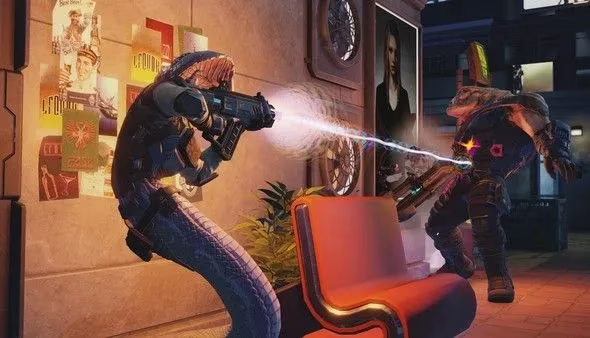I still vividly remember the electric jolt of surprise when Firaxis stealth-launched XCOM: Chimera Squad in April 2020 – a tactical thunderbolt dropping without warning into our strategy-starved lives. Now, five years later, this bold experiment remains etched in my memory like graffiti on City 31's walls. Rather than rehashing the apocalyptic stakes of its predecessors, Chimera Squad dared to explore the messy aftermath of victory – a world where former enemies tentatively shared streets, and my hybrid police force walked the razor's edge between peacekeeping and powder keg diplomacy.

🌍 The Fractured Utopia of City 31
Set five years after XCOM 2's rebellion, Chimera Squad presented a radically transformed world where humans and aliens coexisted in fragile harmony. Imagine former Viper warriors running flower shops while Mutons served as beat cops – this delicate ecosystem felt like watching scorpions and songbirds sharing a terrarium. As commander of the titular squad, I didn't lead soldiers but mediators: part SWAT team, part social experiment. Our headquarters became a pressure cooker where species-specific tensions simmered beneath tactical briefings.
⚡️ Tactical Revolution: Breach Mode & Interwoven Turns
Firaxis detonated convention with two seismic gameplay shifts:
-
Breach Mode: Each mission began with heart-pounding breach planning:
-
Multiple entry points with risk/reward tradeoffs (ventilation shafts vs main doors)
-
Unit positioning determining attack sequence
-
Environmental interactions (shoot through walls, gas line explosions)
-
Interlaced Initiative System: Abandoning traditional faction-based turns felt like replacing chess with jazz improvisation. My hybrid squad's actions alternated with enemies in real-time, creating:
| Turn System | Effect | Tension Level |
|-------------|--------|--------------|
| Classic XCOM | Predictable chess match | 🎯→🎯→🎯 |
| Chimera Squad | Unscripted rhythm game | 💥🎹💥🎹💥 |
This created exquisite moments where a Muton's suppression fire would seamlessly set up a human sniper's kill shot – tactical synergy flowing like mercury between team members.
👽 Hybrid Dynamics: Beyond Human Centricity
Commanding aliens wasn't just cosmetic; it rewrote tactical DNA:
-
Vipers could bind enemies like living barbed wire
-
Mutons tanked damage like mobile concrete barriers
-
Hybrids blended abilities into devastating combos
The roster felt like assembling a orchestra where each instrument defied classical categorization – a tuba that could suddenly shred guitar solos. This diversity forced me to abandon human-centric strategies and embrace unpredictable synergies.
💰 The $10 Revolution
Chimera Squad's pricing model remains legendary – launching at just $10 (half the eventual $20 price). This wasn't DLC but a concentrated espresso shot of tactical innovation. For the cost of two coffees, we received:
-
30+ hour campaign
-
11 unique agents with personal storylines
-
Procedurally generated city districts
❓ People Also Ask
Q: How does Chimera Squad differ from mainline XCOM games?
A: It trades global warfare for localized policing operations, emphasizing rapid response tactics over base management. The condensed scale creates more intimate storytelling.
Q: Can I play without knowing previous XCOM lore?
A: Absolutely! While enriched by series history, the self-contained narrative stands strong. Think of it as a spin-off TV series rather than direct sequel.
Q: Is the alien/human dynamic just cosmetic?
A: Far from it! Species-specific abilities force complete tactical reinvention. A Viper's tongue pull fundamentally changes positioning calculus versus human grenadiers.
🔭 My Personal Future Vision
Five years later, I crave a spiritual successor that evolves Chimera Squad's DNA. Imagine procedurally generated alien cities where hybrid units must negotiate cultural clashes while containing outbreaks of interspecies violence. Picture diplomacy systems where arresting a beloved community figure sparks riots requiring non-lethal crowd control. The potential for tactical storytelling in this universe remains as vast and unexplored as the aliens' original homeworlds.
Replaying Chimera Squad today feels like handling plutonium-infused porcelain – dazzlingly beautiful yet perpetually volatile. Its tactical innovations remain as refreshing as drinking liquid starlight, proving that sometimes the boldest revolutions come in compact packages. While the series has since returned to epic-scale conflicts, this scrappy spin-off endures as proof that Firaxis isn't afraid to detonate their own formulas to create something brilliantly unexpected.
For readers interested in exploring more tactical team-based gameplay and strategy insights, OverwatchTactics offers a wealth of guides and analysis focused on squad dynamics and hero synergies in Overwatch. Check out their homepage at OverwatchTactics for further inspiration on mastering hybrid tactics across different gaming universes.